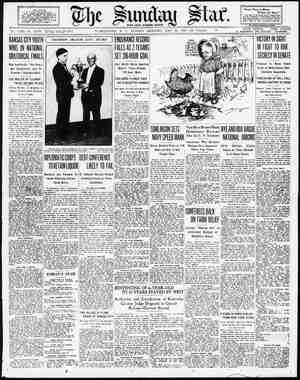Evening Star Newspaper, May 26, 1929, Page 97
You have reached the hourly page view limit. Unlock higher limit to our entire archive!
Subscribers enjoy higher page view limit, downloads, and exclusive features.
Tdo Much Romance Ruins M arriage, Says 'lFiflérggzzfiékaébzevz In an Interview With Lillian G. Glenn Love Belongs to Youth, and What a Man Really Wants Out of Matri- ~amony. Is Comfort and Flétter)/, " Declares the Novelist— “F; ifty Per Cent of Marriage Is Bound to Be ,7’ : Mom)tony. OU who believe that marriage must be a thing of romance, of love and of glamour, or nothing at all, listen to the words of Joseph Hergesheimer, the famous novelist. “Too much love and romance ruins mar- riage. In its finest flower it belongs to youth. ‘The middle-aged and the married should have nothing to'do with it. It is an enemy of peace and reasonable, proper relationships. - is an economic and social arrange- ment. It is the business of running a house, having babies, taking charge of the cooking, paying bills and having the companionship of one whase interests are yours. Fifty per cent ef it must naturally be a monotonous affair. “We haven't the ability to accept ordinary life. We are always after excitement and 1 B 7 Tt i E??éa L ;gégggs »889, 2 T i ] : g . £ Bg i i i i g1 E E L : : Sgg 3 28 g 1y .58 8§ g B 32 i i 1 il : E around for any length of time she'd call him a fool and leave him. Women are realists much more than men, and any romantic inclinations that they have are realistic ones. A man, when he's in love, will be glad to sit on a fence and look at his fair lady’s window, happy to be able to breathe the same air. But a woman? She’ll never get moony. She has a sensible head on her shoulders and she'll never let her romantic impulses run away with her.” MR- HERGESHEIMER also felt that present- day civilization was not conducive to ro- mance. During the period prior to the Civil War women were able to keep romance aglow in their marriages because they devoted their attention purely to graceful and feminine MORE REASON | THAN + “THE SUNDAY STAR, WASHINGTON, D. C., MAY 26, 1922 —PART 7. e P R Joseph Hergesheimer, the novelist, who, while discounting the value of romance in moderm: marriage, believes that even a passable marriage is better than bachelorhood. “An atmosphere of romanticism pervaded the country at that time. This was particularly true of the Old South. Evenings then were filled by a hight elegance of conversation and women showed their adroitness with French turns of speech, with music and poetry. They made a profession of being women, and charm was considered their foremost and indispensable attribute. Passionate loyalty, and absorption in the men they married were also chifracteristic of those days. . i o . “Indeed, a woman then thought herself well lost in the man she married, She made every submerge herself in her husband'’s per- RIBBONS! Marriage is more an arrangement of reason and less of something in a pink quilt and ribbons; says Mr. Hergesheimer. There is a certain affection that develops in matrimony that is in every way equal to romantic love—and certainly it is much more comfortable. Spiritual closeness, mental companionship and deep loyalty come only after one has lived with a person for years. If a husband is going to hold his wife, he must be an amusing companion, an understanding friend and a satisfactory lover. We can only love people when we do not see them around all the time. When a man of 40 takes up with a “cutie” it is generally nothing more or less than a momentary escape from the tedium of marriage. There is no greater treat, after a day’s work, than to have one’s wife greet him, becomingly gowned and delightfully perfumed. sonality. His necessity was hers. The worldl was, of course, a masculine one, founded on' the assumption that men were superior in strength and in mental equipment to women. The superiority of women lay in purity and! fidelity, in beauty and all the domestic virtues.. This was the universal ideal of happiness and! marriage. “But many changes have since come about. Women no longer regard men as gods, nor is: marriage their one and ultimate goal. As a. result, woman'’s whole attitude toward men and. toward marrisge is different. If a husband is: going to hold- his wife, he must be an amusing: companion, an intelligent and understanding: friend and a satisfactory lover. Just to be able: as well. “How has this happened? Very simply. In. the past it was important for men to be both. symmetrical Today, though,. it is money that has become of primary im- this [ riages of today with what they were 50 . ‘There was not so much common life then. The small apartments have brough$ about an intimacy and a closeness that is degri« mental and even fatal to the marital relation« ship. One must not only have the opportunity for solitude and the expression of individuality, but also be able to retain enough illusion for husband and wife to be attractive to each other. ‘This business of openly beautifying oneself, of walking around with a clay mask or shaving cream on one’s face, or with uncombed hair, is all bad. Living 30 close together makes tha husband and wife calloused and coarsened to~ ward each other, and before you know it they are getting on each other’s nerves. “Romance may be an iliusory glamour, but, . When this was comment« s er confided that his tories were written as an escape from the Continued on Ninih Page.
